
Florodora is an Edwardian musical comedy. After its long run in London, it became one of the first successful Broadway musicals of the 20th century. The book was written by Jimmy Davis under the pseudonym Owen Hall, the music was by Leslie Stuart with additional songs by Paul Rubens, and the lyrics were by Edward Boyd-Jones, George Arthurs and Rubens.

San Toy, or The Emperor's Own is a "Chinese" musical comedy in two acts, first performed at Daly's Theatre, London, on 21 October 1899, and ran for 768 performances. The book was written by Edward Morton, and the musical score was written by Sidney Jones with lyrics by Harry Greenbank and Adrian Ross. Additional songs were written by Lionel Monckton. The cast included Marie Tempest, Scott Russell, Huntley Wright and Rutland Barrington.

The Geisha, a story of a tea house is an Edwardian musical comedy in two acts. The score was composed by Sidney Jones to a libretto by Owen Hall, with lyrics by Harry Greenbank. Additional songs were written by Lionel Monckton and James Philp.
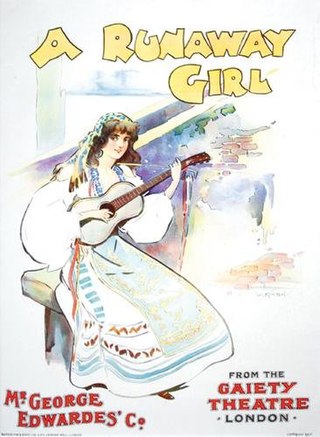
A Runaway Girl is an Edwardian musical comedy in two acts written in 1898 by Seymour Hicks and Harry Nicholls. The composer was Ivan Caryll, with additional music by Lionel Monckton and lyrics by Aubrey Hopwood and Harry Greenbank. It was produced by George Edwardes at the Gaiety Theatre, London, opening on 21 May 1898 and ran for a very successful 593 performances. It starred Hicks's wife, Ellaline Terriss and the comic actor Edmund Payne.

Elsie Cotton, known professionally as Lily Elsie, was an English actress and singer during the Edwardian era. She was best known for her starring role in the London premiere of Franz Lehár's operetta The Merry Widow.

The Shop Girl was an Edwardian musical comedy in two acts written by Henry J. W. Dam, with lyrics by Dam and Adrian Ross and music by Ivan Caryll, and additional numbers by Lionel Monckton and Ross. It premiered at the Gaiety Theatre in London in 1894 and ran for an extremely successful 546 performances. Its cast included Seymour Hicks, George Grossmith Jr., Arthur Williams, Edmund Payne, and Ellaline Terriss. It soon played in New York and was successfully revived in London in 1920.
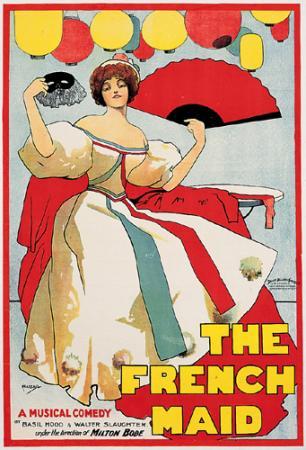
The French Maid is a musical comedy in two acts by Basil Hood, with music by Walter Slaughter, first produced at the Theatre Royal, Bath, England, under the management of Milton Bode on 4 April 1896. It then opened London's Terry's Theatre under the management of W. H. Griffiths beginning on 24 April 1897, but later transferred to the Vaudeville Theatre on 12 February 1898, running for a very successful total of 480 London performances. The piece starred Louie Pounds, Kate Cutler, Eric Lewis, Herbert Standing and Richard Green. There was a New York production in 1897.
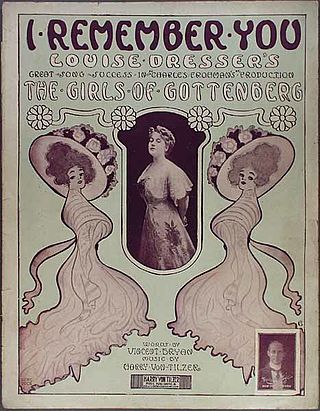
The Girls of Gottenberg is an Edwardian musical comedy in two acts by George Grossmith, Jr. and L. E. Berman, with lyrics by Adrian Ross and Basil Hood, and music by Ivan Caryll and Lionel Monckton. P. G. Wodehouse's personal papers indicate that he wrote the lyrics for one song, "Our Little Way", but this was not included in the libretto of show, and he was not credited as a lyricist. Set in Germany, the comedy of the show is largely based on stereotypes of the German people and their culture as seen through a British lens.

An Artist's Model is a two-act musical by Owen Hall, with lyrics by Harry Greenbank and music by Sidney Jones, with additional songs by Joseph and Mary Watson, Paul Lincke, Frederick Ross, Henry Hamilton and Leopold Wenzel. It opened at Daly's Theatre in London, produced by George Edwardes and directed by James T. Tanner, on 2 February 1895, transferring to the Lyric Theatre on 28 May 1895, and ran for a total of 392 performances. The piece starred Marie Tempest in the title role, Hayden Coffin, Letty Lind, Leonora Braham, Eric Lewis, Maurice Farkoa, Marie Studholme, and Louie Pounds. It also had a Broadway run at the former Broadway Theatre from 21 December 1895 through 8 February 1896.

The School Girl is an Edwardian musical comedy, in two acts, composed by Leslie Stuart with a book by Henry Hamilton and Paul M. Potter, and lyrics by Charles H. Taylor and others. It concerns a French school girl from a convent, who goes to Paris to help her lovesick friend. Through mistaken identity, she learns secrets that help her at the Paris stock exchange and ends up at a students' ball in the Latin Quarter. All ends happily.
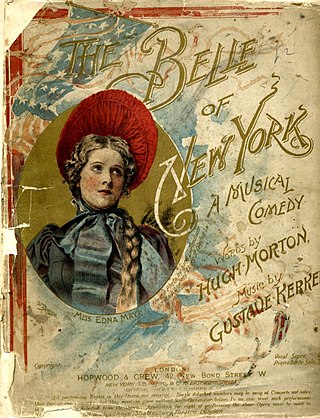
The Belle of New York is a musical comedy in two acts, with book and lyrics by Hugh Morton and music by Gustave Kerker, about a Salvation Army girl who reforms a spendthrift, makes a great sacrifice and finds true love.

The Catch of the Season is an Edwardian musical comedy by Seymour Hicks and Cosmo Hamilton, with music by Herbert Haines and Evelyn Baker and lyrics by Charles H. Taylor, based on the fairy tale Cinderella. A debutante is engaged to a young aristocrat but loves a page.

Miss Hook of Holland is an English musical comedy in two acts, with music and lyrics by Paul Rubens with a book by Austen Hurgon and Rubens. The show was produced by Frank Curzon and opened at the Prince of Wales Theatre on 31 January 1907, running for a very successful 462 performances. It starred Harry Grattan and Isabel Jay.
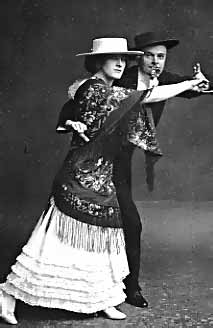
The Sunshine Girl is an Edwardian musical comedy in two acts with a book by Paul A. Rubens and Cecil Raleigh, lyrics and music by Rubens and additional lyrics by Arthur Wimperis. The story involves a working girl who falls in love with the heir to the factory. He is in disguise and wants to be loved for himself, not his position, so he gets his friend to pose as the heir, leading to complications for both men.

Ada Reeve was an English actress of both stage and film. Reeve began to perform in pantomime and music hall as a child. She gained fame in Edwardian musical comedies in the 1890s.

The Girl from Utah is an Edwardian musical comedy in two acts with music by Paul Rubens, and Sidney Jones, a book by James T. Tanner, and lyrics by Adrian Ross, Percy Greenbank and Rubens. The story concerns an American girl who runs away to London to avoid becoming a wealthy Mormon's newest wife. The Mormon follows her to England, but she is rescued from a bigamous marriage by a handsome actor.

Coralie Blythe, was an English actress and singer, who is best remembered for her numerous postcard photos and her roles in Edwardian musical comedy. Although she never became a big star, she worked steadily in London's West End and in British provincial theatres from her teen years until after World War I, especially for producer George Edwardes, and had a few roles in America. She sometimes performed with her husband, Lawrence Grossmith, and her brother, Vernon Castle.

Lady Madcap is an Edwardian musical comedy in two acts, composed by Paul Rubens with a book by Paul Rubens and Nathaniel Newnham-Davis, and lyrics by Paul Rubens and Percy Greenbank. The story concerns a mischievous Earl's daughter who holds a ball at her father's castle without permission, pretends to be her own maid, and causes general confusion.

The Belle of Brittany is an Edwardian musical comedy in two acts set in 'Daffodil Time' in rustic 18th-century Brittany. It premiered at the Queen's Theatre in London on 24 October 1908. The music is by Howard Talbot and Marie Horne, to a book by Leedham Bantock and P. J. Barrow, with lyrics by Percy Greenbank. A Broadway production opened at Daly's Theatre in New York in November 1909 and ran for 72 performances. It was directed by Frank Smithson and featured Josephine Brandell and Margaret Dumont in early roles.

Ruby Ray was an Argentine-born English actress, dancer and singer who performed mainly in Edwardian musical comedy.





















